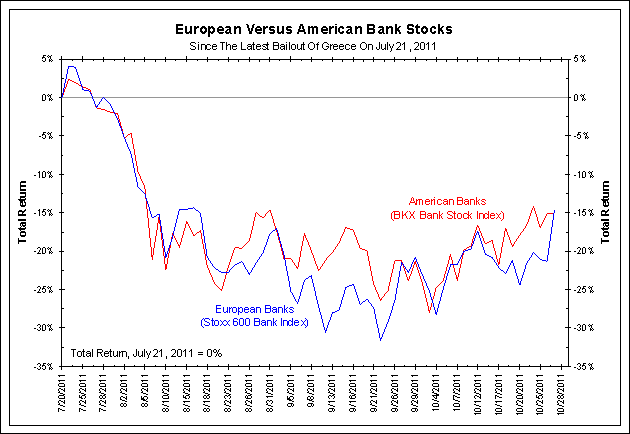EU Banks Must Raise Capital
The Wall Street Journal – European Banks Look to Reassure on Capital Needs
Europe’s banks sought to reassure investors Thursday that they won’t tap them for fresh capital needed under a €106 billion recapitalization plan designed to make the sector more resilient to sovereign shocks. Spanish, French and Italian banks need around €50 billion in fresh capital under a European Union-wide agreement forged late Wednesday that analysts said was largely in line with market expectations and is part of broader efforts to restore the region’s financial health. However, several large banks from the countries early Thursday said they won’t have to turn to shareholders for the money, and analysts affirmed that many banks should be able to accrue capital by retaining earnings and disposing of assets…EU banks supervisor the European Banking Authority said around 70 banks in the 27-country bloc must add roughly €106.4 billion to their capital reserves to reflect price declines in the Greek and other sovereign debt they hold, and to generally bolster capital held against their assets. Final shortfall estimates will be released next month and banks will have until the end of the year to tell domestic regulators how they plan to come up with the money.
Asia To The Rescue?
The Wall Street Journal – Europe Turns to Asia for Help With Bailout
European officials have quickly turned to Asia to help bankroll their plan to ease Greece’s debt obligations and prevent its fiscal collapse—but it won’t be an easy sell. French President Nicolas Sarkozy was set to call his Chinese counterpart, Hu Jintao, just hours after the deal, and the head of the euro zone’s bailout fund was heading to China and Japan, cap in hand. But both Asian powerhouses have made clear that while they are willing to help Europe, they will invest on their own terms. The visit by Klaus Regling, of the European Financial Stability Facility, or EFSF, probably won’t bear fruit immediately, as China has indicated to International Monetary Fund officials that Beijing would contribute only through the IMF and in conjunction with Brazil, India and Russia, the other major emerging economies that together with China make up the so-called BRIC nations.
Comment
Reading between the lines, the Chinese want the U.S., who make up 18% of the IMF, to bear some of the burden of the European bailout. Sarkozy might want to consider a call to Obama as well.
Bloomberg.com – Sarkozy to Seek China Aid as EU Expands Rescue Fund
French President Nicolas Sarkozy said he plans to call Chinese counterpart Hu Jintao today to discuss China contributing to Europe’s efforts to resolve the region’s debt crisis…“China will need time to evaluate this plan very carefully,” said Shen Jianguang, a Hong Kong-based economist for Mizuho Securities Asia Ltd. “What worries China is that there is so much disagreement among European policy makers. It doesn’t want to be seen spending money on a plan that even Europeans don’t want to support.”
The Wall Street Journal – Europe’s High Price for China’s Friendship
Premier Wen Jiabao and other Chinese leaders have toured the continent, promising support for Greece, Spain and Italy in their hour of need. But beyond a few inconclusive data points, and hints from European officials who have every interest in talking up buying activity, it isn’t clear that China’s purchases of European debt have increased. The State Administration of Foreign Exchange—the manager of China’s foreign-exchange reserves—is focused on safety rather than returns. A dash into debt issued by distressed European countries appears unlikely. If Europe wants serious infusions of cash from China, it is going to have to put some real assets, or policy concessions, on the table. That process is already under way. In July 2010, Chinese state-owned shipping giant Cosco signed a 35-year lease on a Greek port for $4.2 billion. For a major trading nation, you can’t get much more strategic than a port. Beyond bricks and mortar, China has other interests to pursue with Brussels. Designation as a market economy under World Trade Organization rules could be top of the list—this would limit Europe’s capacity to take actions against the Chinese on trade matters. Mr. Wen has already dropped a broad hint that China’s support for a debt-ridden Europe would be tied to a change of heart by the EU on this key question.
Source: Arbor Research, LLC


